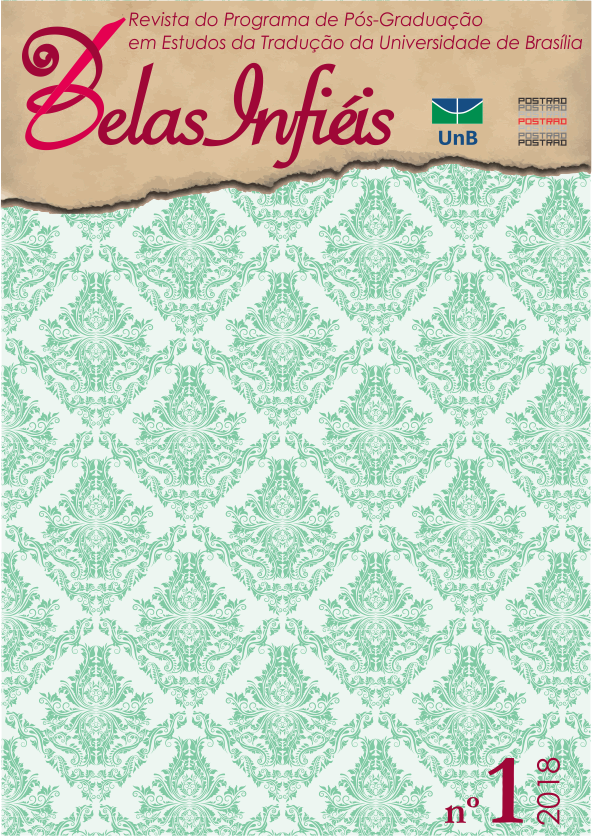Da tradução e suas voltas:
uma reflexão em torno do processo tradutório de “Darle vueltas a una ceiba”
DOI:
https://doi.org/10.26512/belasinfieis.v7i1.12468Palabras clave:
Estudos da Tradução, Processo tradutório, Literatura hispano-americana, Cabrera InfanteResumen
Este artigo expõe uma reflexão pessoal sobre o processo tradutório do conto “Darle vueltas a una ceiba”, do escritor cubano Guillermo Cabrera Infante. Com uma linguagem pautada na oralidade, o relato concebe uma Havana quase pitoresca, com suas ruas, sua gente, costumes e crenças. Partindo da ideia de que traduzir significa desempenhar uma atividade ética, estética e experimental, as reflexões apresentadas neste texto discorrem sobre a experiência da própria autora quanto à s estratégias de tradução adotadas, especialmente no que concerne ao contexto cultural e à linguagem do conto, que oscila entre vernácula, coloquial, burlesca e irônica. As apreciações conceituais se respaldam, sobretudo, em três eixos teóricos fundamentais para a teoria da tradução literária: a tradução criativa ou transcriação, conforme proposta por Haroldo de Campos (1962), a hospitalidade linguística, nos termos de Paul Ricoeur e Antoine Berman, e a ideia de lealdade/fidelidade, tratada amplamente por distintos pensadores da tradução, entre os quais Humberto Eco.
Descargas
Citas
BERMAN, Antoine. A tradução e a letra ou o albergue do longínquo. Tradução Marie-Hélène C. Torres, Mauri Furlan, Andreia Guerini. 2. ed. Florianópolis: Copiart, PGET/UFSC, 2013. 200p.
BERMAN, Antoine. Toward a translation Criticism: John Donne. Tradução e edição Françoise Massardier-Kenney. Kent: The Kent State University Press, 2009. 249p.
CABRERA INFANTE, Guillermo. Todo está hecho con espejos. Cuentos casi completos. Madrid: Alfaguara, 1999.
CABRERA INFANTE, Guillermo. Tres tristes tigres. 7ª ed. Barcelona: Seix Barral, 1998.
CAMPOS, Haroldo de. Metalinguagem & outras metas. 4ª ed. São Paulo: Perspectiva, 1992.
DENIS, Alberto. ArrajaTabla: Como un volador de a peso. Una frase que acuñaron los cubanos de antaño. 2015. Disponível em: <http://arrajatabla.net/como-un-volador-de-a-peso/>. Acesso em: 07 fev. 2017.
ECO, Umberto. Quase a mesma coisa. Tradução de Eliana Aguiar. Rio de Janeiro: Record, 2007. 458p.
HALBWACHS, M. A memória coletiva. Tradução de Beatriz Sidou. São Paulo: Centauro, 2006.
MESCHONNIC, Henri. Ethics and politics of translating. Translated and edited by Pier-Pascale Boulanger. Tel Aviv: Benjamins Translation Library, 2007.
OLIVEIRA, Paulo. Tradução & ética. In: AMORIN, Lauro Maia; CARNEIRO RODRIGUES, Cristina; STUPIELLO, Érika Nogueira de Andrade (Orgs.). Tradução & perspectivas teóricas e práticas. 1.ed. São Paulo: Editora Unesp Digital, 2015. Disponível em: <http://static.scielo.org/scielobooks/6vkk8/pdf/amorim-9788568334614.pdf>. Acesso em: 15 jan. 2016. Páginas 71-97.
PEGENAUTE, Luis. La traducción del posmodernismo hispanoamericano: reflexiones sobre la interpretación de la cultura. Parallèles: Cahiers de l'École de Traduction et d'Interprétation de l'Université de Genève 19, 1997-1998, pp.177-192.
REAL ACADEMIA ESPAÑOLA. Diccionario de la lengua española. 22ª ed. Madrid, 2001. Disponível em: <http://www.rae.es/rae.html>. Acesso em: diferentes datas.
RICOEUR, Paul. Sobre a tradução. Tradução de Patricia Lavelle. Belo Horizonte: Editora UFMG, 2011. 71p.
RÓNAI, Paulo. A tradução vivida. Rio de Janeiro: EDUCOM, 1976.
TYMOCZKO, M. Translation and political engagement: activism, social change and the role of translation in geopolitical shifts. The Translator, v.6, n.1, p.23-47, 2000. Special Issue: Translation and Minority.
VENUTI, Lawrence. Escândalos da tradução. Tradução de Laureano Pelegrin et al. Bauru: EDUSC, 2002.
Descargas
Publicado
Cómo citar
Número
Sección
Licencia
Copyright Statement
Given the public access to this journal, the texts are free to use but requires the recognition of the original authorship and initial publication in this journal to be properly stated.
The journal allows the use of works published for non-commercial purposes, including the right to submit the work to publicly accessible databases. Published contributions are the sole and exclusive responsibility of the author(s).
- When submitting papers to be evaluated by the Belas Infiéis journal, the author(s):
- Declare that the contents of the contributions are original and of their original creation, being entirely responsible for their content if there is an objection by third parties.
- Claim to be aware that they should not commit academic plagiarism.
- Declare that the manuscript has not been published, completely or partially, in Portuguese or another language. If it is a translation it should be submitted to the Translated Articles section.
- Declare that the manuscript is not being evaluated by other journals.
- Declare that the manuscript was not submitted to another journal simultaneously.
- Commit(s) to inform the journal of any kind of error or inaccuracy in their contribution (published, in evaluation or in editing) and to collaborate with the editors to make due corrections of the article (when in evaluation or editing) or erratum/retraction (after publication).
- Declare that there is no conflict of interest regarding the published work.
- Authorize its release if it is accepted for publication without any kind of monetary compensation.
- Agree to assign non-exclusive rights to publication to the magazine, remaining free to make their contribution available in other media as long as the publication of the first version in Belas Infiéis magazine is mentioned. They also authorize Belas Infiéis to assign their texts for reproduction in content indexers, virtual libraries and similar platforms.
- Maintain copyright and grant the journal the right of first publication, the work being licensed under theCreative Commons Attribution License.
- Is/Are allowed and encouraged to publish and distribute their work online after the editorial process, which may increase the impact and citation of the published work.
- Authorize the editorial team to make textual adjustments and to adapt the article to the publication rules, when necessary.



















